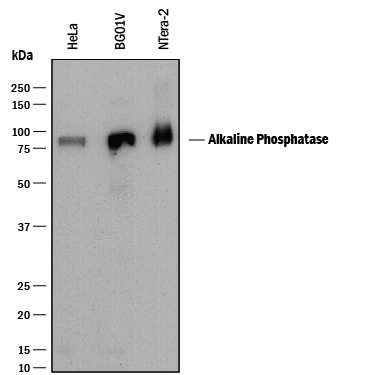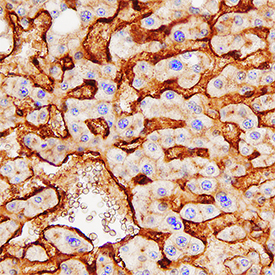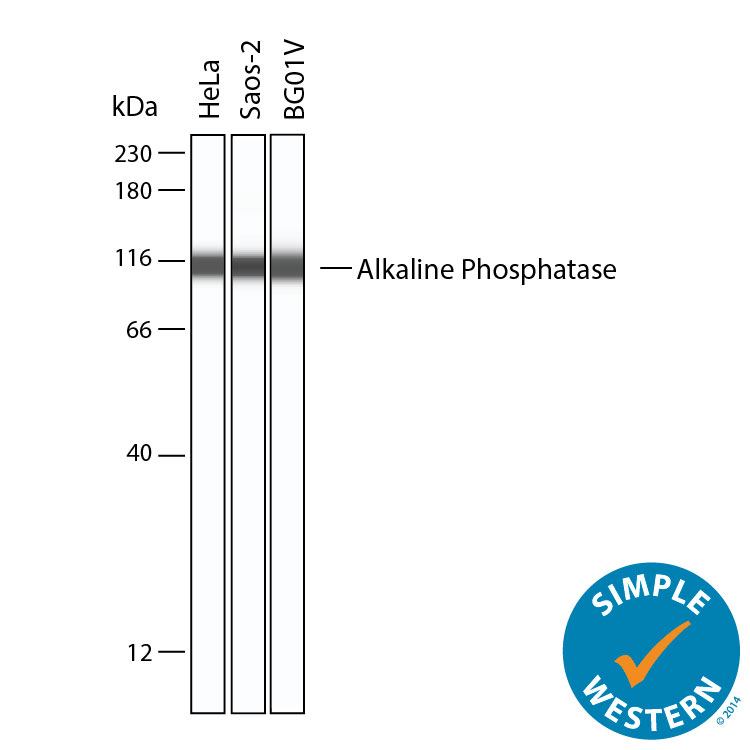Human Alkaline Phosphatase/ALPL Antibody Summary
Leu18-Ser502
Accession # P05186
Applications
Please Note: Optimal dilutions should be determined by each laboratory for each application. General Protocols are available in the Technical Information section on our website.
Scientific Data
 View Larger
View Larger
Detection of Human Alkaline Phosphatase/ALPL by Western Blot. Western blot shows lysates of HeLa human cervical epithelial carcinoma cell line, BG01V human embryonic stem cells, and NTera-2 human testicular embryonic carcinoma cell line. PVDF membrane was probed with 0.25 µg/mL of Mouse Anti-Human Alkaline Phosphatase/ALPL Monoclonal Antibody (Catalog # MAB29092) followed by HRP-conjugated Anti-Mouse IgG Secondary Antibody (HAF018). A specific band was detected for Alkaline Phosphatase/ALPL at approximately 80 kDa (as indicated). This experiment was conducted under reducing conditions and using Immunoblot Buffer Group 1.
 View Larger
View Larger
Alkaline Phosphatase/ALPL in Human Liver. Alkaline Phosphatase/ALPL was detected in immersion fixed paraffin-embedded sections of human liver using Mouse Anti-Human Alkaline Phosphatase/ALPL Monoclonal Antibody (Catalog # MAB29092) at 0.3 µg/mL overnight at 4 °C. Tissue was stained using the Anti-Mouse HRP-DAB Cell & Tissue Staining Kit (brown; CTS002) and counterstained with hematoxylin (blue). Specific staining was localized to bile canaliculi. View our protocol for Chromogenic IHC Staining of Paraffin-embedded Tissue Sections.
 View Larger
View Larger
Detection of Human Alkaline Phosphatase/ALPL by Simple WesternTM. Simple Western lane view shows lysates of HeLa human cervical epithelial carcinoma cells, Saos‑2 human osteosarcoma cells and BG01V human embryonic stem cells, loaded at 0.2 mg/mL. A specific band was detected for Alkaline Phosphatase/ALPL at approximately 115 kDa (as indicated) using 5 µg/mL of Mouse Anti-Human Alkaline Phosphatase/ALPL Monoclonal Antibody (Catalog # MAB29092). This experiment was conducted under reducing conditions and using the 12‑230 kDa separation system.
Reconstitution Calculator
Preparation and Storage
- 12 months from date of receipt, -20 to -70 °C as supplied.
- 1 month, 2 to 8 °C under sterile conditions after reconstitution.
- 6 months, -20 to -70 °C under sterile conditions after reconstitution.
Background: Alkaline Phosphatase/ALPL
Four distinct genes encode alkaline phosphatases (APs) in humans (1). The ALPL gene encodes the liver/bone/kidney isozyme, also known as the tissue-nonspecific AP (TNAP). In comparison, ALPI, ALPP and ALPPL2 encode intestinal, placental and placental-like or germ cell APs, respectively. The serum levels of human APs are useful tumor markers (2). There are many mutations in the ALPL gene, leading to different forms of hypophosphatasia, characterized by poorly mineralized cartilage and bones (3). The native ALPL is a glycosylated homodimer attached to the membrane through a GPI-anchor. The C-terminal pro peptide (residues 503‑524) is not present in the mature form.
- Le Du, M-H. and J.L. Millan (2002) J. Biol. Chem. 277:49808.
- Millan, J.L. and W.H. Fishman (1995) Crit. Rev. Clin. Lab. Sci. 32:1.
- Di Mauro, S. et al. (2002) J. Bone Miner. Res. 17:1383.
Product Datasheets
Citations for Human Alkaline Phosphatase/ALPL Antibody
R&D Systems personnel manually curate a database that contains references using R&D Systems products. The data collected includes not only links to publications in PubMed, but also provides information about sample types, species, and experimental conditions.
2
Citations: Showing 1 - 2
Filter your results:
Filter by:
-
Skeletal dysplasia-causing TRPV4 mutations suppress the hypertrophic differentiation of human iPSC-derived chondrocytes
Authors: AR Dicks, GI Maksaev, Z Harissa, A Savadipour, R Tang, N Steward, W Liedtke, CG Nichols, CL Wu, F Guilak
Elife, 2023-02-22;12(0):.
Species: Human
Sample Types: Cell Lysates
Applications: Western Blot -
Mitochondrial TNAP controls thermogenesis by hydrolysis of phosphocreatine
Authors: Y Sun, JF Rahbani, MP Jedrychows, CL Riley, S Vidoni, D Bogoslavsk, B Hu, PA Dumesic, X Zeng, AB Wang, NH Knudsen, CR Kim, A Marasciull, JL Millán, ET Chouchani, L Kazak, BM Spiegelman
Nature, 2021-05-12;0(0):.
Species: Mouse
Sample Types: Whole Cells
Applications: ICC
FAQs
No product specific FAQs exist for this product, however you may
View all Antibody FAQsReviews for Human Alkaline Phosphatase/ALPL Antibody
There are currently no reviews for this product. Be the first to review Human Alkaline Phosphatase/ALPL Antibody and earn rewards!
Have you used Human Alkaline Phosphatase/ALPL Antibody?
Submit a review and receive an Amazon gift card.
$25/€18/£15/$25CAN/¥75 Yuan/¥2500 Yen for a review with an image
$10/€7/£6/$10 CAD/¥70 Yuan/¥1110 Yen for a review without an image

